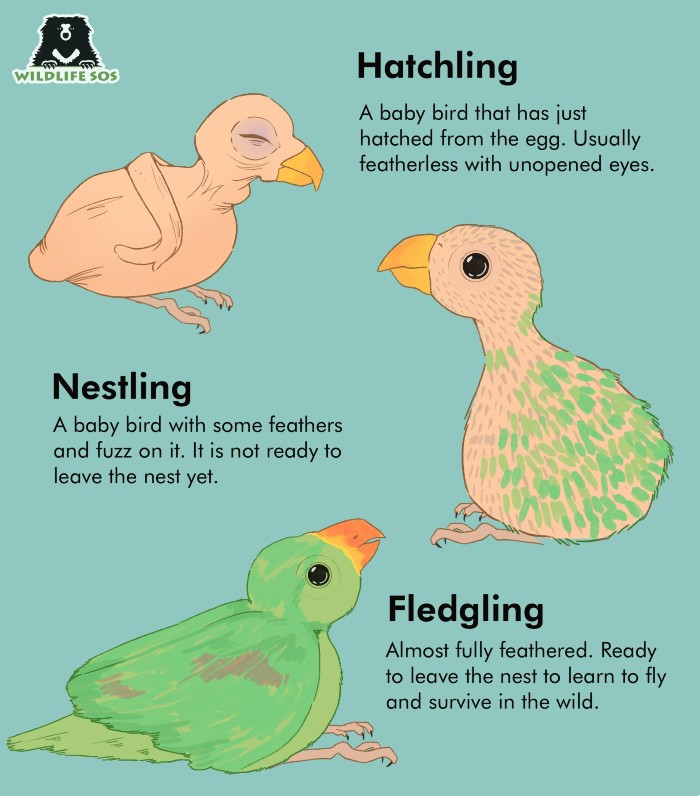
A Comprehensive Guide to Caring for a Baby Bird
Introduction
Baby birds, with their delicate features and vulnerable nature, require specialized care to ensure their survival and well-being. Whether you encounter an orphaned or injured baby bird, understanding their unique needs is crucial. This comprehensive guide will provide you with the essential knowledge and practical steps to care for a baby bird effectively.
Identifying the Bird Species
Before providing care, it’s important to identify the bird species. Different species have specific dietary and environmental requirements. You can identify the bird by its appearance, behavior, and vocalizations. Refer to field guides or consult with a wildlife rehabilitator for assistance.
Providing Shelter
Create a warm and secure shelter for the baby bird. Use a small box lined with soft material, such as a towel or fleece. Ensure the box has adequate ventilation and is placed in a quiet, draft-free location.
Maintaining Body Temperature
Baby birds are unable to regulate their body temperature effectively. Provide a heat source to maintain their warmth. Use a heating pad set to low or a warm water bottle wrapped in a towel. Monitor the bird’s temperature regularly to prevent overheating or hypothermia.
Feeding the Baby Bird
The type of food a baby bird requires depends on its species. Insectivorous birds need live insects, while altricial birds (those that hatch naked and helpless) require a specialized formula.
Insectivorous Birds:
- Feed live insects, such as mealworms, crickets, or waxworms.
- Use a pair of tweezers to offer the insects to the bird’s beak.
- Ensure the insects are small enough for the bird to swallow.
Altricial Birds:
- Purchase a commercially available formula specifically designed for baby birds.
- Mix the formula according to the manufacturer’s instructions.
- Use a syringe or dropper to feed the bird small amounts of formula every few hours.
Feeding Frequency
The frequency of feeding depends on the bird’s age and species. As a general guideline:
- Newborn birds: Feed every 15-30 minutes.
- 1-2 weeks old: Feed every 2-3 hours.
- 3-4 weeks old: Feed every 3-4 hours.
Hydration
Baby birds require hydration, especially if they are not eating or drinking on their own. Use a syringe or dropper to offer small amounts of water to the bird’s beak.
Hygiene
Maintain a clean environment for the baby bird. Regularly clean the shelter and bedding. Avoid handling the bird excessively, as this can stress it.
Socialization
If possible, provide the baby bird with socialization with other birds of the same species. This helps them develop natural behaviors and vocalizations.
Medical Care
If the baby bird exhibits any signs of illness or injury, seek veterinary attention immediately. Common symptoms to watch for include:
- Lethargy
- Difficulty breathing
- Discharge from the eyes or beak
- Loss of appetite
- Diarrhea
Rehabilitation and Release
The ultimate goal of caring for a baby bird is to rehabilitate it and release it back into the wild. Once the bird is fully grown and healthy, consult with a wildlife rehabilitator to determine the appropriate time and location for release.
Additional Tips
- Handle the baby bird gently and avoid excessive noise or movement.
- Do not give the bird human food or water.
- If the bird is injured, do not attempt to treat it yourself. Seek professional veterinary care.
- Be patient and persistent. Caring for a baby bird requires time and dedication.
- Contact a wildlife rehabilitator if you are unable to provide adequate care for the bird.
Conclusion
Caring for a baby bird is a rewarding but challenging experience. By understanding their unique needs and providing them with proper care, you can help these vulnerable creatures thrive and return to their natural habitat. Remember to always prioritize the bird’s well-being and seek professional assistance when necessary.
